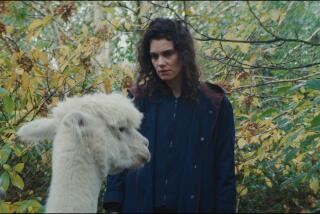The Courtship of Jane Austen’s Characters : COLIN FIRTH TALKS ABOUT ‘PRIDE AND PREJUDICE’ IN THE 20TH CENTURY
- Share via
LONDON — The hottest writer this side of the 19th century doesn’t belong just to the movies.
“Pride and Prejudice,” arguably Jane Austen’s best-known work, comes to the small screen in the BBC’s rollicking $9.6-million six-hour version, courtesy of A&E.; This, on the heels of her recent success on the big screen with “Persuasion” and “Sense and Sensibility,” with “Emma” still to come.
For British actor Colin Firth, who essays “pride” as the novel’s Mr. Darcy, giving life to the author’s tale of courtship and class in 19th-century England proved a challenge. “Colin Firth of the 20th century would not be happy in this period, but as an actor I adore exploring Jane Austen’s strict social conventions. Convention required you to withhold your sexuality right up to the end.”
The story revolves around five sisters, chiefly Elizabeth Bennet (Jennifer Ehle), whose misinformed prejudice toward the very correct and proud Mr. Darcy almost dooms the strong attraction they feel for each other. Laurence Olivier played Darcy as stiff and remote in the 1940 film opposite Greer Garson. In this production, Firth unbends a little, making Darcy “a man who doesn’t interact a lot of the time,” he says, “but is capable of gestures of love.”
At 35, Firth looks quite the Regency buck in his tight-fitting trousers and tall hat as he plays a scene being shot in a classically proportioned Georgian church in Deptford, a working-class area of South London.
But all is upper-class in front of the BBC’s cameras: Mr. Darcy is forcing a bounder named George Wickham to keep his promise to marry Elizabeth’s flighty sister Lydia.
“Our Darcy is warm-blooded and passionate,” says director Simon Langton. “Yes, he’s aloof and arrogant at times, but Colin shows what’s attractive about him underneath.’
This version of “Pride and Prejudice” is full of fun, with 15 scenes involving dancing; balls were the main social occasions of the period and Austen sets scene after scene to music. Keeping to the BBC’s usual standards for scrupulous historical accuracy, the dresses are made for movement. “Our actresses wearing these unrestrained--that is to say, braless--costumes vault over fences and jump around while dancing, giving us an idea of the vitality of this pre-Victorian age,” Langton notes.
In England the production was attacked for revisionism. In particular, a scene not written by Austen, in which Mr. Darcy emerges from a bath wrapped in a towel, caused tongues to wag. Presumably men did such things in those days but Austen pretended they didn’t.
“We treated the story with great respect,” Langton says, “but if we wanted to be utterly faithful we would have got someone to recite it on the radio.”
“Mr. Darcy has a few absurd aspects to him,” Firth says. “But playing him you can’t try to be funny. Darcy himself says, ‘It’s been my study to avoid ridicule.’ He’s definitely not a man to be laughed at. Which, of course, causes the comedy.”
“Pride and Prejudice” airs Sunday at 5 and 9 p.m. and continues Monday and Tuesday at 6 and 10 p.m. on A&E.;
More to Read
Only good movies
Get the Indie Focus newsletter, Mark Olsen's weekly guide to the world of cinema.
You may occasionally receive promotional content from the Los Angeles Times.










